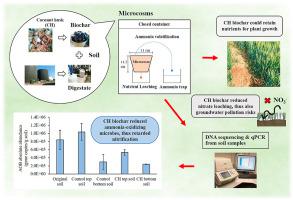Environmental Pollution ( IF 7.6 ) Pub Date : 2020-09-18 , DOI: 10.1016/j.envpol.2020.115684 Jidapa Plaimart , Kishor Acharya , Wojciech Mrozik , Russell J. Davenport , Soydoa Vinitnantharat , David Werner

|
Anaerobic digestate and biochar are by-products of the biogasification and pyrolysis of agricultural wastes. This study tested the hypothesis that combined application of anaerobic pig/cattle manure digestate and coconut husk (CH) biochar can improve soil nutrient conditions, whilst minimizing atmospheric and groundwater pollution risks. Microcosms simulated digestate application to agricultural soil with and without CH biochar. Ammonia volatilization and nutrient leaching were quantified after simulated heavy rainfalls. Archaeal and bacterial community and abundance changes in soils were quantified via next generation sequencing and qPCR of 16S rRNA genes. Nitrifying bacteria were additionally quantified by qPCR of functional genes. It was found that CH biochar retarded nitrate leaching via slower nitrification in digestate-amended soil. CH biochar reduced both nitrifying archaea and bacteria abundance in soil by 74-83 percent in the top 4 cm soil layer and 66-73 percent in the deeper soil layer one month after the digestate application. Methanotroph abundances were similarly reduced in the CH biochar amended soils. These findings demonstrate combined benefits of anaerobic digestate and CH biochar application which are relevant for the development of a more circular rural economy with waste minimization, renewable energy production, nutrient recycling and reduced water pollution from agricultural land.
中文翻译:

椰壳生物炭改良剂通过抑制厌氧消化后施用的农业土壤中的硝化作用,提高了养分的保留能力
厌氧消化物和生物炭是农业废弃物生物气化和热解的副产品。这项研究检验了以下假设:厌氧猪/牛粪消化物和椰子壳(CH)生物炭的组合使用可以改善土壤养分状况,同时最大程度减少大气和地下水污染的风险。微观世界模拟了在有和没有CH生物炭的情况下对农业土壤的消化应用。在模拟暴雨之后,对氨挥发和养分淋失进行了定量。通过下一代测序和16S rRNA基因的qPCR定量分析古细菌和细菌群落以及土壤中的丰度变化。还通过功能基因的qPCR对硝化细菌进行了定量。研究发现,CH生物炭在消化改良土壤中通过较慢的硝化作用而延迟了硝酸盐的浸出。施用沼肥后一个月,CH生物炭在最上层4 cm土层中降低了土壤硝化古细菌和细菌的丰度,降低了74-83%,在更深的土层中降低了66-73%。在甲烷生物炭改良土壤中,甲烷营养菌的丰度也降低了。这些发现证明了厌氧消化和CH生物炭应用的综合益处,与减少废物,减少可再生能源生产,养分循环利用和减少农业用地水污染的更循环的农村经济的发展有关。











































 京公网安备 11010802027423号
京公网安备 11010802027423号